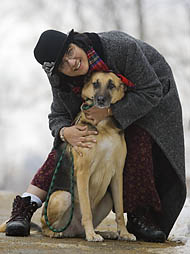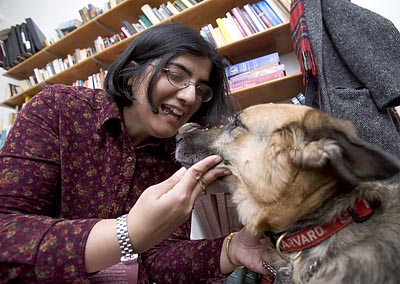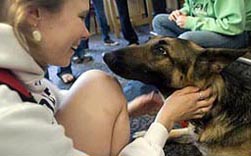For the Love of Dogs
As Associate Professor of English Lavina Shankar taught her course in South Asian literature on March 13, 2006, she steeled herself for what would follow her class: the death of her dog, Phoebe, whose life would end after 54 weeks of treatment for lymphoma.
In preparing for Phoebe’s euthanasia that afternoon, Shankar decided not to discuss one poem that, by chance, was on the syllabus that day: Rabindranath Tagore’s “Recovery 14,” which describes how a dog’s pure love can help one contemplate humanity: “Only this creature / Has pierced through good and bad and seen / Complete man.”

Lavina Shankar and Phoebe, photographed in December 2005 on the historic Quad and, below, in the professor's Pettigrew Hall office.
Ending her class, Shankar tried to skip out. But a student called out: “We haven’t read the dog poem.” Shankar paused. Could she refuse a student’s desire to learn? Could she really not discuss, at that moment, this painful poem about a dog’s unconditional love for humans?
Years earlier, on a May afternoon in 1997, Shankar sat on the front steps of her Nichols Street apartment, deep in conflict. She and her husband, Rajiv, had just adopted Phoebe, and Shankar was scared of the animal. Actually, she’d been scared of dogs most of her life, a fear accentuated by a negative childhood experience with a dog.
Shankar thought her fears were conquered in graduate school, when she befriended a gentle dog belonging to a friend. But Phoebe was a big, boisterous German Shepherd mix. And just thinking about the dog’s attempts to smooch her kept Shankar awake at night.
There were two choices, said Rajiv: Keep the dog or return her immediately. Shankar grew up in Calcutta and recalled volunteering in Mother Teresa’s orphanage as a teenager, where sometimes children were adopted and then returned. “It’s the worst thing you can do to a baby,” she says. That memory made up Shankar’s mind. Phoebe would stay, and Shankar would choose to love her.
From 1997 to 2006, Shankar went from fearing the animal to adoring her to being her primary caregiver during her chemotherapy treatments. “By the end, her love for Phoebe helped her get over her fears,” says Lewiston veterinarian Ruth Burgess. “I’ve seen that so many times: You can do so much more than you think you can.”
Perhaps that sense of empowerment helped Shankar choose to discuss Tagore’s “Recovery 14” on March 13, 2006. Her tears flowed, but in choosing to teach rather than flee, Shankar conquered her fear of Phoebe’s death. She also faced another anxiety: that she might not be with her parents, in India, when they eventually pass away. “Humans live on the edge of normalcy, never knowing what’s around the corner,” she says. “We must live as though it’s not the last moment.”
During Phoebe’s illness, Shankar decided she would repay the community — “human and non-human,” she says — that taught her lessons about humanity, mortality, and spirituality. She began to construct a new Short Term course, “For the Love of Dogs,” using literature and service-learning to examine the relationship and boundaries between humans and dogs.
She began working on the course in early 2006. Texts came from enough perspectives — Flush by Virginia Woolf, Marley & Me by John Grogan, and The Companion Species Manifesto by Donna Haraway — to ensure the course’s intellectual teeth. “I didn’t want this course to just be, ‘Let’s talk about our sad stories about our dogs,’” Shankar says. Analyzing texts from a new perspective, Shankar heightened her own awareness of familiar authors.

With help from veterinarian Burgess — and from a Harward Center for Community Partnerships grant — Shankar added service-learning opportunities, with the Androscoggin Humane Society, the Lewiston Veterinary Hospital, and My Wonderful Dog, a service-dog program.
Shakespearean scholar Marjorie Garber, L.H.D. ’06, whose book Dog Love was a central part of the course reading, says dogs, humans, and service-learning are a snug fit because the two species have a “commutable relationship. People love dogs; dogs love people. People serve dogs; dogs serve people,” she says. “Real-world interactions are increasingly important in today’s colleges, so if dogs help cross this divide, that’s commendable.”
Shankar says the course’s service-learning component honors the “avenue of experience and emotion” she and Rajiv traveled during Phoebe’s treatment. New relationships with veterinarians, oncologists, kennel workers, and other dog lovers “tipped the balance of what you think of as your community,” she says. For example, a local limo driver, Bob Dackmine, who drives Shankar to the airport, phoned during the ordeal. “Bob called me,” Shankar mused. “My best friends didn’t.”
Shankar has created nine courses at Bates, but “For the Love of Dogs,” which she taught in 2007, is the first to force her away from her disciplinary comfort zone of feminist theory and Asian American, South Asian, and modern British literature. The experience gives Shankar greater enthusiasm for exploring new scholarly areas. She also feels more connected to her students, less afraid of sharing life experiences, and more willing to learn from them and others. “Usually, a teacher must appear omniscient to her students. But the experience with Phoebe made me unafraid of not knowing,” she says.
Taking a broader view, Shankar adds that “the freedom of a place like Bates allows faculty and students to examine their own lives and learn to live them better. This is the liberal arts education: learning for living, not merely learning to make a living.”
 Afterword: Following Phoebe’s death, the Shankars adopted Heidi, shown at left with a student in Lavina’s “For the Love of Dogs” Short Term course last spring. “Phoebe will never be replaced, but she’ll live on in the course,” she says.
Afterword: Following Phoebe’s death, the Shankars adopted Heidi, shown at left with a student in Lavina’s “For the Love of Dogs” Short Term course last spring. “Phoebe will never be replaced, but she’ll live on in the course,” she says.